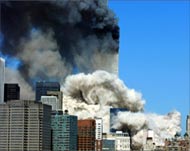Iraq war ‘increased terrorism risk’
The war in Iraq has created a new generation of Islamic radicals and has increased the threat of terrorist attacks, according to a US intelligence report cited in American newspapers.

The National Intelligence Estimate “says that the Iraq war has made the overall terrorism problem worse,” The New York Times said quoting an unspecified official.
The report – Trends in Global Terrorism: Implications for the United States – is the first formal assessment of global terrorism by US intelligence agencies since the Iraq war began and represents the view of the 16 different spy services inside the government, The New York Times said.
The newspaper said the report avoided specific judgements about the likelihood that terrorists would strike on US soil again; but concluded that the overall terror threat has increased since the September 11, 2001, attacks.
“The estimate concludes that the radical Islamic movement has expanded from a core of al-Qaeda operatives and affiliated groups to include a new class of ‘self-generating’ cells inspired by al-Qaeda’s leadership, but without any direct connection to Osama bin Laden or his top lieutenants,” the newspaper said.
War on terror
In a series of recent speeches to mark the fifth anniversary of the attacks, George Bush, the US president, outlined successes in the war on terror and argued that Iraq was the key to defeating terrorists around the world.
 |
|
The report says that the risk of |
Robert Kennedy, a senator in the Democrat opposition, said; “According to reports, this intelligence document should put the final nail in the coffin for President Bush’s phoney argument about the Iraq war”.
Analysts began working on the report in 2004, but it was not completed until April this year.
Some government officials were reportedly unhappy with the structure and focus of earlier versions of the document.
The newspaper said that the earlier drafts described actions by the US government that were believed to have increased extremist activity, such as the indefinite detention of prisoners at Guantanamo Bay and the Abu Ghraib prison abuse scandal.
Government policies
It is unclear whether the final draft of the intelligence estimate criticises specific government policies, The Times said. But intelligence officials involved in preparing the document said its conclusions were not softened or massaged for political purposes.
The Washington Post said that although intelligence officials agreed that the US had seriously damaged al-Qaeda and disrupted its ability to plan and direct major operations, radical Islamic networks had spread and decentralised.
Many of the new cells, the report concludes, have no connection with any central structure and communicate only among themselves, getting their inspiration, ideology and tactics from more than 5,000 extremist websites.
The websites claim that the Iraq war is a Western attempt to conquer Islam by first occupying Iraq and establishing a permanent presence in the Middle East.